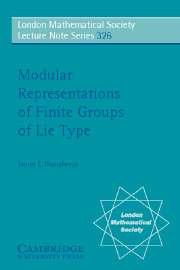Book contents
- Frontmatter
- Contents
- Preface
- 1 Finite Groups of Lie Type
- 2 Simple Modules
- 3 Weyl Modules and Lusztig's Conjecture
- 4 Computation of Weight Multiplicities
- 5 Other Aspects of Simple Modules
- 6 Tensor Products
- 7 BN-Pairs and Induced Modules
- 8 Blocks
- 9 Projective Modules
- 10 Comparison with Frobenius Kernels
- 11 Cartan Invariants
- 12 Extensions of Simple Modules
- 13 Loewy Series
- 14 Cohomology
- 15 Complexity and Support Varieties
- 16 Ordinary and Modular Representations
- 17 Deligne–Lusztig Characters
- 18 The Groups G2(q)
- 19 General and Special Linear Groups
- 20 Suzuki and Ree Groups
- Bibliography
- Frequently Used Symbols
- Index
20 - Suzuki and Ree Groups
Published online by Cambridge University Press: 23 November 2009
- Frontmatter
- Contents
- Preface
- 1 Finite Groups of Lie Type
- 2 Simple Modules
- 3 Weyl Modules and Lusztig's Conjecture
- 4 Computation of Weight Multiplicities
- 5 Other Aspects of Simple Modules
- 6 Tensor Products
- 7 BN-Pairs and Induced Modules
- 8 Blocks
- 9 Projective Modules
- 10 Comparison with Frobenius Kernels
- 11 Cartan Invariants
- 12 Extensions of Simple Modules
- 13 Loewy Series
- 14 Cohomology
- 15 Complexity and Support Varieties
- 16 Ordinary and Modular Representations
- 17 Deligne–Lusztig Characters
- 18 The Groups G2(q)
- 19 General and Special Linear Groups
- 20 Suzuki and Ree Groups
- Bibliography
- Frequently Used Symbols
- Index
Summary
In this chapter we look at the simple groups found by Ree and Suzuki, which exist only over fields of characteristic 2 or 3. The Suzuki groups are subgroups of an algebraic group of type B2 (= C2) when p = 2, while the two families of Ree groups occur in algebraic groups of types G2 when p = 3 and F4 when p = 2. The idea is to combine Chevalley's special isogeny (5.3) with a standard Frobenius map, then take fixed points.
In contrast to the theory for Chevalley groups and their twisted analogues of types A,D,E6, the representation theory of these groups in the defining characteristic p = 2 or p = 3 involves just one fixed prime and therefore does not raise the genericity questions considered earlier. On the other hand, there is still much to be made explicit as the power of p grows.
Here we review the literature dealing with Suzuki and Ree groups, giving some examples and indicating some unsolved problems. After recalling how the groups are constructed (20.1), we discuss their simple modules (20.2). Beyond this, the treatment of projective modules, Cartan invariants, extensions, and cohomology is somewhat fragmentary. The Suzuki groups have been best studied. Similarly, while all the ordinary characters have been determined (20.7), their reduction modulo p has not been worked out in detail for Ree groups.
- Type
- Chapter
- Information
- Modular Representations of Finite Groups of Lie Type , pp. 205 - 212Publisher: Cambridge University PressPrint publication year: 2005



